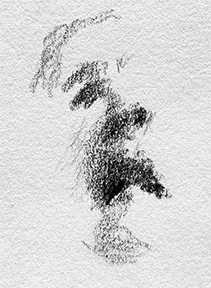Jacob Hoffman
It was a typical day at Alter Cocker Elder Care. At precisely 1 pm—after they had finished their lunch—six of the residents were wheeled into the center of the large recreation room. They were placed in a circle and sat in silence, each waiting for the first one to talk. Leah got the ball rolling: “Did you get a load of that horrible meal they served us today?” After raising what was left of her eyebrows, Eva whined, “Horrible is right. I could show that cook a thing or two about making stuffed cabbage.” Noah added, “My wife used to make potato pancakes. They were so good that they were eaten right off the griddle. These were greasy and too salty.” Benjamin turned to Eva and asked, “And how about that dessert? They call that babka?” “I used to make babka for my family,” Rachel boasted. “There was never any left on the plate.” When Jacob Hoffman first came to the nursing home, everyone was polite and friendly. They tried to get him to talk—or at least smile—but soon they stopped trying. He just stared into space with a frozen face and a frozen body, day after day. No one looked his way or even tried to communicate with him anymore. Jacob sat in the wheelchair circle, listening to the comments of the group and silently chuckling as he remembered his wife Esther’s terrible cooking. |
She would eagerly present him with her recipes of gefilte fish, chicken soup, matzo balls, brisket, and kugel. They all tasted terrible, but he loved her so much that he never said a disparaging word. She never complained like these people did. She was humble and appreciated him for who he was and for what they had together. She gave him her love and attention, and he treasured every day that he shared with her. When he got sick, she was by his side. Once she could no longer care for Jacob, she placed him in this nursing home and died soon afterward. Even these tender thoughts about Esther didn’t change Jacob’s frozen existence. He wanted to speak, smile, cry, and laugh, but there was no connection between his brain and his body. He was a prisoner, enduring a life of silence, unable to express himself … but he had so much to say! If he could, he would tell the nursing home residents to show gratitude for the lovely place they all shared. He would thank the cooking staff for including traditional Jewish food at their dining table. He would remind everyone to cherish the fact that they were still alive and were able to talk to each other. The more he thought about it, he realized that there was a reason they were in that nursing home. After all, “alter cocker” is the Yiddish phrase for “old and complaining person.” Jacob knew that he was in the wrong place, but he couldn’t tell anyone about it. From Carpet Creatures: Tales from the Deep Pile To join the Carpet Creatures project, please visit our TAE Gallery website. |


















































